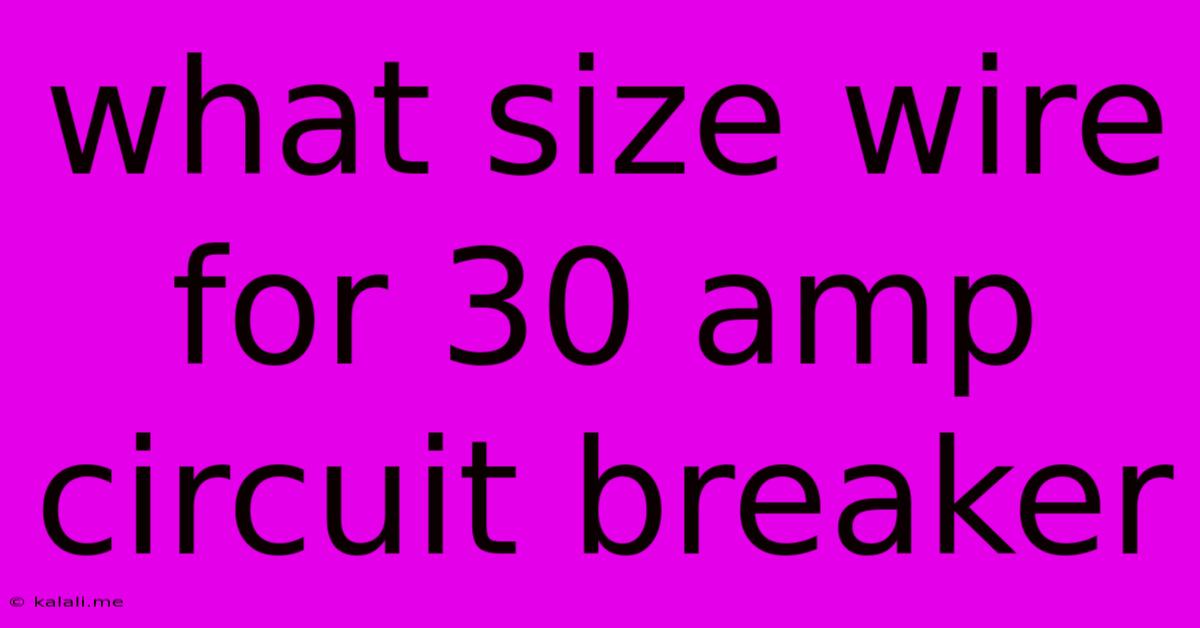What Size Wire For 30 Amp Circuit Breaker
Kalali
May 30, 2025 · 3 min read

Table of Contents
What Size Wire for a 30 Amp Circuit Breaker? A Comprehensive Guide
Choosing the correct wire gauge for your 30-amp circuit breaker is crucial for electrical safety and preventing fire hazards. Using a wire that's too thin can lead to overheating and potential electrical fires, while using a wire that's too thick is unnecessary and wasteful. This guide will help you determine the appropriate wire size for your 30-amp circuit breaker, covering various factors and considerations.
Understanding the Importance of Correct Wiring
A 30-amp circuit breaker protects a circuit from overcurrent. However, the breaker alone isn't enough. The wiring must also be capable of handling the current. Using undersized wire can cause the wire to overheat, potentially melting insulation and causing a fire. This is why code dictates specific wire gauge requirements based on the amperage of the breaker.
Factors Determining Wire Size for a 30 Amp Circuit Breaker
Several factors influence the wire size you need for a 30-amp circuit:
-
Amperage: The 30-amp rating of the breaker is the primary determinant. The wire must be rated to carry at least this amperage continuously without overheating.
-
Wire Type: Different wire types have different current-carrying capacities. Common types include copper and aluminum. Copper wire generally has higher current-carrying capacity than aluminum wire of the same gauge. You'll also find different insulation types (e.g., THHN, THWN) which affect temperature ratings.
-
Installation Location: The ambient temperature where the wiring is installed impacts the wire's current-carrying capacity. Higher temperatures reduce the wire's ability to handle current. Wiring in attics or other hot spaces requires larger gauge wire than wiring in cooler areas.
-
Number of Conductors in Conduit: Running multiple conductors within the same conduit reduces the current-carrying capacity of each wire due to heat buildup. This requires using a larger wire gauge to compensate.
Recommended Wire Gauge for a 30 Amp Circuit Breaker
For a 30-amp circuit breaker using copper wire, the generally recommended wire gauge is 10 AWG (American Wire Gauge). This size provides ample capacity to handle the 30-amp load safely, even with some margin for derating due to factors like ambient temperature or multiple conductors.
For aluminum wire, a larger gauge, such as 8 AWG, is typically recommended for a 30-amp circuit to compensate for aluminum's lower conductivity.
Always Consult the National Electrical Code (NEC)
The information provided here is for general guidance. Always refer to the latest edition of the National Electrical Code (NEC) and local electrical codes for precise requirements regarding wire sizing for your specific location and application. These codes provide detailed tables and calculations to determine the appropriate wire gauge based on all relevant factors.
Choosing the Right Wire: A Recap
Selecting the appropriate wire size for a 30-amp circuit breaker is critical for safety and code compliance. The recommended gauge is usually 10 AWG copper or 8 AWG aluminum, but always consult the NEC and local electrical codes to ensure you meet all safety and regulatory requirements. When in doubt, consult a qualified electrician. This is not a project for DIY enthusiasts without proper knowledge and experience.
Disclaimer: This article is for informational purposes only and should not be considered professional electrical advice. Always consult with a qualified electrician before undertaking any electrical work. Improper wiring can lead to serious injury or property damage.
Latest Posts
Latest Posts
-
How To Vent A Tub Drain
May 31, 2025
-
How To Get Another Person To Configure Relms Settingsa
May 31, 2025
-
Chords In The A Major Scale
May 31, 2025
-
One Of Which Or One Of Whom
May 31, 2025
-
How To Find The Period From A Graph
May 31, 2025
Related Post
Thank you for visiting our website which covers about What Size Wire For 30 Amp Circuit Breaker . We hope the information provided has been useful to you. Feel free to contact us if you have any questions or need further assistance. See you next time and don't miss to bookmark.